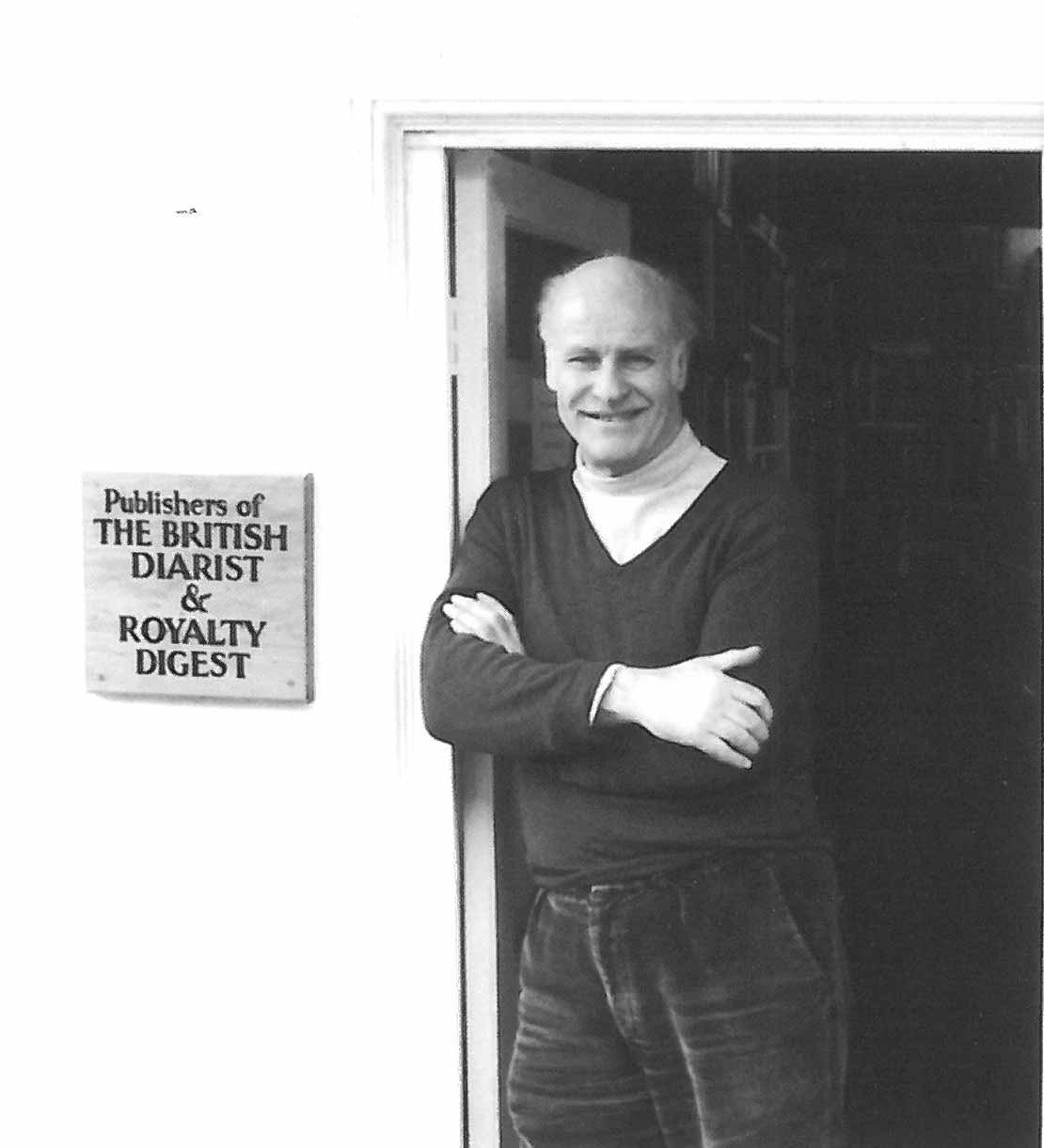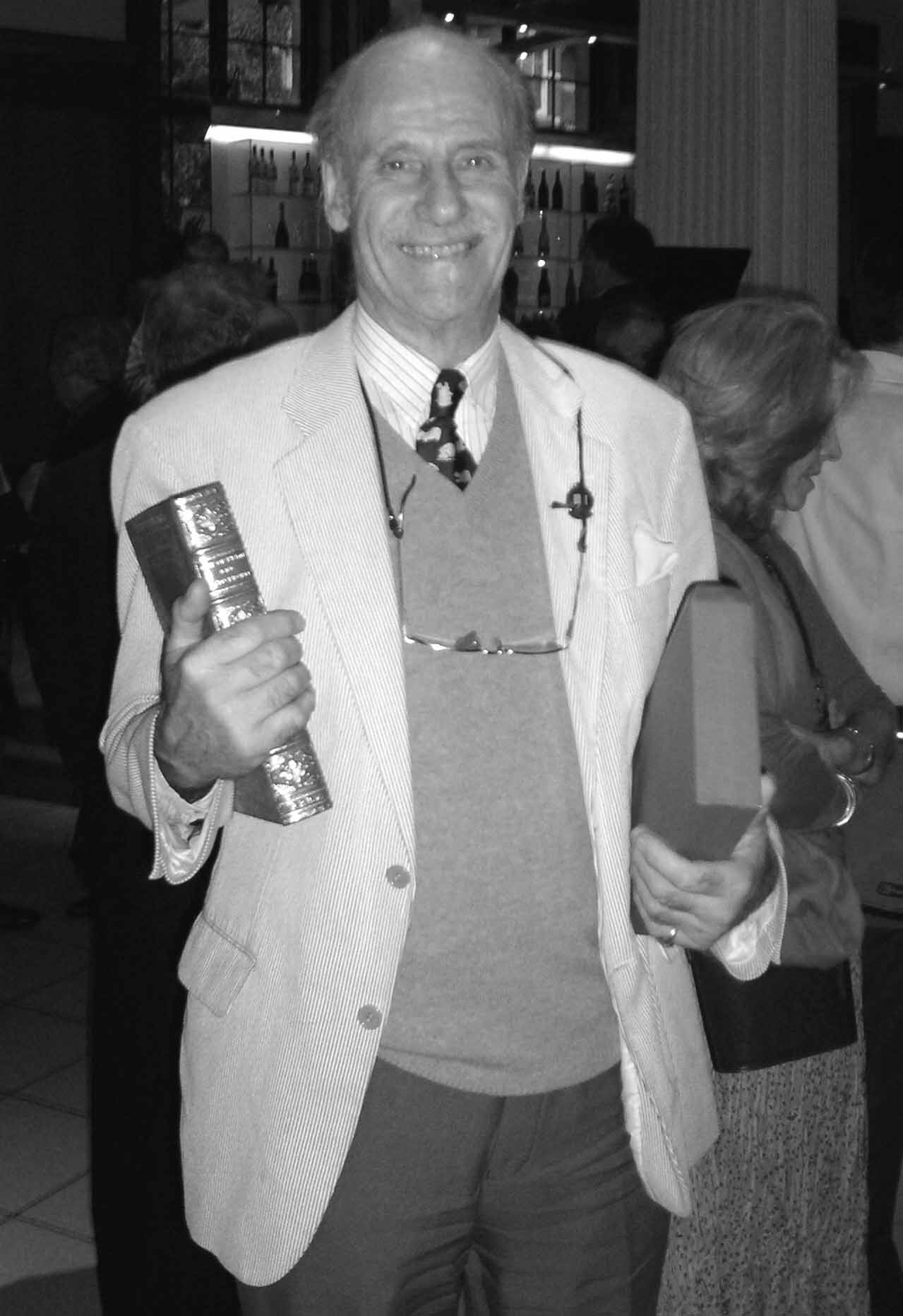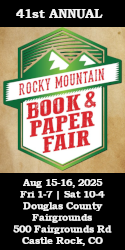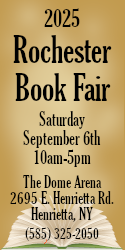Paul Minet
When writing about Paul Minet, one scarcely knows where to begin. I knew one of his bookshops, World of Books on Sackville Street, just across and down the road from Sotheran’s, some years before we actually met. It was in the late ’70s or early ’80s just before Paul and his family went on extended sabbatical to Greece where, as he sometimes put it, he got to know his children better while taking time to write his early memoirs that were published with the title Late Booking: My First Twenty-five Years in the Secondhand Book Trade. I believe the title was chosen after careful thought. Paul wanted to be a bookseller to Everyman – offering good used, antiquarian (and sometimes new) books that were affordable to readers at every income level. He was less interested in selling extremely expensive and rare books to people who might never read them – although he certainly had the resources to do it. It will be interesting to see which direction the antiquarian book trade ultimately takes in the light of the present e-book phenomenon.
Late Booking... was published in 1989 and Wayne Somers reviewed it favorably, in fact quite enthusiastically, in the March 1990 issue of this magazine. In February of the same year we were visiting bookshops in London, attended both of the antiquarian book fairs that used to be held each month in the Russell Square area of Bloomsbury, and on one of our days off drove down to Rochester and met Paul at Baggins Books, generally recognized at the time as one of Britain’s largest antiquarian bookshops.
 Although Paul was able to delegate the day-to-day running of Baggins to members of staff, he was often in the thick of any hard work that had to be done when large collections had to be moved or sorted. With all of his involvement in writing columns for various magazines, (ABMR for one, which he had founded in 1974), his editorship of The British Diarist and Royalty Digest, service on various committees of the ABA, including terms as President and Treasurer, active support of various charities, including Chethams Library in Manchester and the French Hospital of La Providence (a Huguenot charity of which he and his family were benefactors, Paul himself a director), I was quite unprepared and surprised to meet him for the first time with his sleeves rolled up (metaphorically, if not in fact) while he was in the middle of moving a large collection of books.
Although Paul was able to delegate the day-to-day running of Baggins to members of staff, he was often in the thick of any hard work that had to be done when large collections had to be moved or sorted. With all of his involvement in writing columns for various magazines, (ABMR for one, which he had founded in 1974), his editorship of The British Diarist and Royalty Digest, service on various committees of the ABA, including terms as President and Treasurer, active support of various charities, including Chethams Library in Manchester and the French Hospital of La Providence (a Huguenot charity of which he and his family were benefactors, Paul himself a director), I was quite unprepared and surprised to meet him for the first time with his sleeves rolled up (metaphorically, if not in fact) while he was in the middle of moving a large collection of books.
Taking a break from the work at hand, he joined us for coffee at a nearby outdoor cafe where he proposed the idea of a “Letter from England” to appear in each issue of Book Source Monthly, as we were then called. His idea, which I took to immediately, was that there might be some American readers who would be interested in some general news of the English antiquarian book scene. In this business I knew of no one more connected or more suited to the undertaking. And I still don’t.
During his early years writing for and editing The New Daily, a Liberal newspaper founded in the 1960s, Paul honed his talent as an essayist while working under the pressure of a daily deadline, eventually becoming City and then Managing Editor. His paper took on a leadership role in promoting the idea of the European Common Market, and Paul’s series of articles supporting the EEC were collected and published in a book entitled An ABC of the Common Market. As Paul says in his memoir, “I had been a Liberal (with a large L) since the time of Suez” [When Britain’s Tory government, France and Israel attacked Egypt in order to seize control of the Canal, ultimately backing down under combined American & Soviet pressure].
All of this and a great deal more is recounted in Late Booking... and I only mention it to give you an idea of how his work habits were most likely influenced by his early days as a journalist. And, if you can imagine it, during this period he was also able to find some time to continue scouting for books.
Paul was adept at “multi-tasking” long before that term became a tired cliché. Once, when we were talking about his next column over the phone, I asked about the splashing sound I was hearing in the background. It had been a very long day and discussing something he’d just written while relaxing in the bath tub just seemed like a sensible thing to do. It made for a good joke later on. This last might seem out-of-character or counter-intuitive to people who mainly recall his more formal or serious demeanor especially when meeting him for the first time – I think his imposing physical presence may have had something to do with it.
His wife Sheila, in addition to helping out with the business and being active in community affairs, is also one of the bell-ringers (not the same as being part of a hand bell choir) at the ancient St. Mary’s Church (C.E.), a short walk from their home in the village of Ticehurst. During one of our regular conversations, Paul held his phone out the window just so I could hear Sheila and her fellow bell-ringers performing during what I believe was an evening service. And when we visited last, Sheila invited Raquel and me to the church tower so we could meet her friends, learn the fundamentals of bell-ringing, and try our hand at it. The music is played according to a schematic diagram or unusual written score, the massive bells themselves are out of sight several levels higher, and the whole exercise is not as simple as it sounds. There is a time lag between pulling the ropes and hearing the bells, all of which must be taken into account, and as beginners we were cautioned not to wrap the rope around our wrist to avoid being dragged high off the platform by bells weighing upwards of a half-ton and probably more.
Although he was not a practicing Christian (in the strictly religious sense) and regular church-goer himself, Paul had a lot of respect for the culture and traditions of the Church of England, and I think the order of service for his funeral at St. Mary’s on February 22nd reflected that.
 We like to remember Paul in his more informal moments, like the times having breakfast on the back porch overlooking our gardens in late June of 2009. Paul had heard about our American chipmunks, had wanted to actually see one, and even though we’re nearly over-run with the little critters, it seemed that every time we pointed one out, he’d jump up only to have it disappear into a wood pile before he managed to get a look. When he finally did spot one, he could not have been more delighted – a bird-watcher sighting an ivory-billed woodpecker would not have been more pleased. His interests were truly wide-ranging and unpredictable.
We like to remember Paul in his more informal moments, like the times having breakfast on the back porch overlooking our gardens in late June of 2009. Paul had heard about our American chipmunks, had wanted to actually see one, and even though we’re nearly over-run with the little critters, it seemed that every time we pointed one out, he’d jump up only to have it disappear into a wood pile before he managed to get a look. When he finally did spot one, he could not have been more delighted – a bird-watcher sighting an ivory-billed woodpecker would not have been more pleased. His interests were truly wide-ranging and unpredictable.
Of the various charities he and his family supported, I think Chetham’s Library in Manchester was particularly close to his heart. Chetham’s, founded in 1653, is the oldest public library in the English-speaking
world. It is an independent charity and remains open to readers and visitors free of charge. Unlike older ecclesiastical or university libraries which restrict access to their collections, the Bodleian for example, Chetham’s has always been open to everyone. Paul served for many years as a feoffee (governor or trustee) of the library, giving generously of both time and money.
In Paul’s memory we’ve decided to make a donation to Chetham’s and invite any of our readers who might be similarly inclined to do the same. Checks (sterling or dollars) may be sent to to Michael Powell, Librarian, Chetham’s Library, Long Millgate, Manchester M3 1SB, England, and should be made payable to Chetham’s with a notation or cover letter indicating that the gift is is memory of Paul Minet.
*
I managed to meet up with and visit many long-time friends of this magazine at the Washington Antiquarian Book Fair that took place the weekend of March 3rd. After 37 years it remains one of the jewels of the antiquarian book fair circuit, with a consistently high quality of books on offer. The exhibitors I spoke to both during and afterward, seemed uniformly pleased – however, a few booksellers said they would prefer a return to the old Sunday opening that would allow for a 2-1/2 day rather than a 1-1/2 day fair. The organizers, the Concord Hill School, said all of this will be considered when planning next year’s event.
The following weekend we took part in the first combined Art & Antiques festival in and around the newly-refurbished Morgan Center on the grounds of the old Jekyll Island Club, just off the coast of Georgia. With the Florida Antiquarian Book Fair in St. Petersburg taking place at the same time, there was only one dealer specializing in maps, prints and a small selection of books. There is some talk that next year, with the long-established art show moving to the third weekend in March, coincidentally avoiding a conflict with St. Petersburg, the combined event might be able to attract more bookseller participation.
Our role was simply to mount a modest display and offer an informal presentation relating to this magazine. We were also surprised and pleased that some of our readers from Atlanta and several nearby states, knowing we’ d be there, actually traveled to Jekyll Island to meet us for the first time.
*
When returning to Cazenovia in mid-March, we were greeted by day after day of 80 degree weather that allowed us to get a good start to the gardening season. Even though the temperature has now dipped to freezing levels as I write this, the various types of lettuce, radishes and the like, planted on St. Patrick’s Day, are already up, growing, and well-protected in the type of cold frame described in the last issue.
Frost-sensitive annuals have started to germinate and will be set out in the cold frame when weather permits. Canna Lily, elephant ears, datura, castor beans and other plants intended for our sub-tropical garden are already started in various containers and ready for their summer home. We hope this early start points to a longer growing season this year – with all the talk about long-term changes in weather patterns, I’m reminded that in all forms of life, change is the only real constant. Or to quote Anthony Marshall quoting Giuseppe di Lampedusa’s character in The Leopard : “ ‘If you want things to stay the same, things are going to have to change’ ”.


























